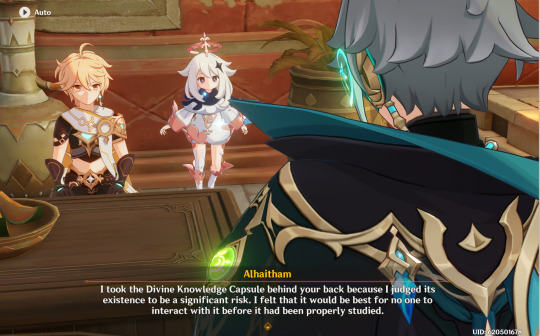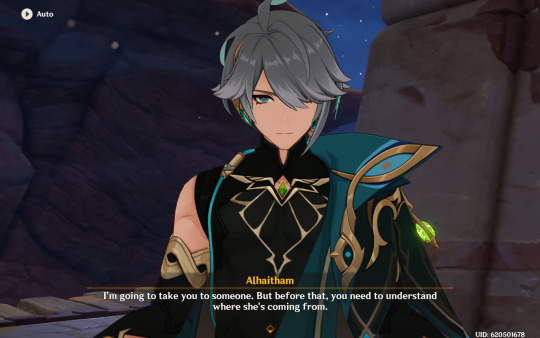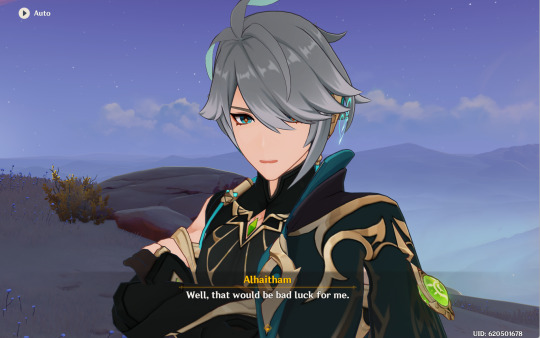#sticking with the in-game punctuation/capitalization of his name for this post bc i'm honestly not 100% sure what's considered correct
Text
Alhaitham is great, actually
Spoilers for Sumeru story quests (Chapter 3, parts 1-4) ahead
If I had one Mora for every time someone called Alhaitham “a walking red flag...”
My personal reading of him is that he’s walking proof that “logical and realistic” isn’t mutually exclusive with “understanding and respectful of emotions,” because he is absolutely both.
Honestly, I find his character really refreshing. Too often, a “rational” character gets oversimplified as one who values facts and empirical evidence to the point of wholly rejecting the importance of feelings. It’s true that Alhaitham is not the most expressive guy on the outside, but he’s not totally dismissive of emotions (his own or others’), either.
In Port Ormos, Alhaitham readily tells the Traveler that he’s dealing with illegal goods and the stakes are high, and explicitly gives them the option to back out of the deal if they find it unsavory. (Compare to Childe and Thoma, who were not as upfront about what they were asking the Traveler to do--regardless of whether it was for nefarious purposes.) Later, at the gathering in Aaru Village, he demonstrates that he can acknowledge and apologize for when his actions could bring harm to others. In my opinion, this sincerity and sensitivity makes him more trustworthy than a lot of the characters we’ve met so far.

Even though he is a scholar who is primarily concerned with factual evidence, it’s not like he’s entirely emotionless. He recognizes his own personal motivations and limitations, as well as their place in a wider context--that someone with as logical and analytical a perspective as him can come off as “callous.” He considers others’ feelings and motivations as well, and even if they’re not flawlessly rational, he doesn’t necessarily outright reject them. His attitude makes him seem cold, but he’s actually a perceptive and understanding person.

The moment that inspired me to make this post was when he declared his interest in becoming a hostage for the Eremites (in exchange for freeing the Village Keepers). Paimon protests, asking, “What if they decide to kill you instead?”
A typical response to this question would be something along the lines of “Don’t worry,” or “I’ll be fine.” Those words are indeed comforting to hear, but they run the risk of downplaying the other person’s concern, or promising something that is ultimately outside of one’s control.
Instead, Alhaitham coolly replies, “Well, that would be bad luck for me.”

It’s a reply that acknowledges that concern without invalidating it, but it’s also straightforward and realistic. Soon afterwards, Alhaitham claims that he “never makes empty promises;” he wouldn’t give the typical sympathetic response if he couldn’t factually guarantee that everything really would be okay. If the Eremites did decide to kill him after all, he’s right--it would suck for him (and by extension, anyone who cared about his safety).
In a happy coincidence, just a few days before this scene, I played the Ballads and Brews event quests, in which Razor considers finding out more about his biological parents; when Rosaria questions him (rather rudely) about what he thinks that information will change about his life, Razor acknowledges the coldness of her proposition. “Cold stings,” he says (iirc), “but good for wounds.” At the time, Razor’s comment puzzled me; it seemed to me like Rosaria was just trying to justify being a jerk to Razor by making unprompted accusations. But I think I understand better after experiencing this particular bit of dialogue in the Archon Quests.
It’s true--Alhaitham’s response is “cold” and it “stings” because, as I mentioned earlier, it’s not the usual sympathetic, reassuring response one would expect after expressing their concern. You could even say that it’s kind of dismissive by comparison. But it is grounding. It acknowledges the very real possibility of bad things happening to someone you care about, without downplaying the anxiety that comes with it. That anxiety is persistent with its “what ifs” and thus can feel like an open wound. But it’s difficult to make a sound argument with such a realistic, sincere response as “Yes, I agree, that would be bad.” I read his response as evidence of his belief that emotions and logic can effectively coexist.
Alhaitham may fall into the “logical genius” archetype in some ways, but he’s not fundamentally insensitive or condescending. While he understands his position and motivations as a scholar operating on “pure rationality” (in Tighnari’s words), he also recognizes the potentially more emotion-laden perspectives of others.

Also, he’s incredibly beautiful and I love him.
#genshin impact spoilers#genshin impact#alhaitham#al haitham#genshin al haitham#sticking with the in-game punctuation/capitalization of his name for this post bc i'm honestly not 100% sure what's considered correct
502 notes
·
View notes